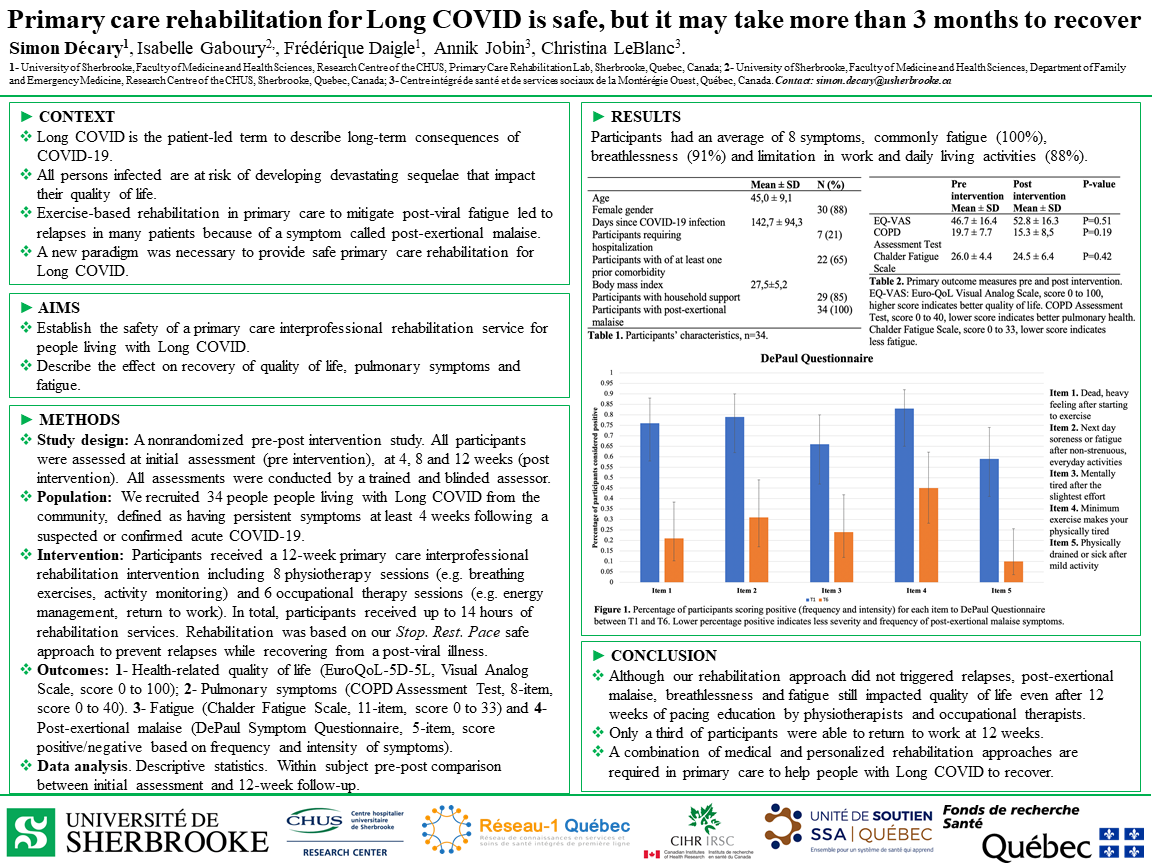PRP064: Primary Care Interprofessional Rehabilitation for Long COVID: A Pilot Safety Study.
Simon Décary, PhD, PT; Isabelle Gaboury, PhD
Abstract
CONTEXT: Long COVID is the patient-led term to describe long-term consequences of COVID-19. All persons infected are at risk of developing devastating sequelae that impact their quality of life. Exercise-based rehabilitation to mitigate post-viral fatigue led to relapses. A new paradigm was necessary to integrate safe rehabilitation within primary care. OBJECTIVES: 1- Establish the safety of a primary care interprofessional rehabilitation service for persons living with Long COVID. 2- Describe the effect on recovery of quality of life, pulmonary symptoms and fatigue. STUDY DESIGN: A nonrandomized pre-post intervention study. All participants were assessed at initial assessment, at 4, 8 and 12 weeks. Population: We recruited persons living with Long COVID from the community, defined as having persistent symptoms at least 4 weeks following a suspected or confirmed acute COVID-19. Intervention: Participants received a 12-week interprofessional rehabilitation intervention including 8 physiotherapy sessions (e.g. breathing exercises, activity monitoring) and 6 occupational therapy sessions (e.g. energy management, return to work). Rehabilitation was based on our Stop.Rest.Pace safe approach to prevent relapses while recovering from a post-viral illness. Outcomes: 1- Health-related quality of life (EuroQoL-5D-5L, Visual Analog Scale); 2- Pulmonary symptoms (COPD Assessment Test). 3- Fatigue (Chalder Fatigue Scale) and 4- Functional measures (e.g. sit-to-stand) and 5- Post-exertional malaise (DePaul Symptom Questionnaire) and adverse events. Data analysis. Within subject pre-post comparison between initial assessment and 12-week follow-up. Comparison of EQ-5D-5L with a matched natural recovery cohort. RESULTS: Thirty-four persons with Long COVID were eligible. Most persons were women (82%) aged 45 years old (range 27 to 63) who had a mean duration of symptoms of 143 days (range 35 to 405). Participants had an average of 8 symptoms, commonly fatigue (100%), breathlessness (91%) and limitation in work and daily living activities (88%). Mean EQ-VAS score at entry was 47 out of 100 (range 3 to 70 out of 100). All participants exhibited post-exertional malaise. Participants will have completed follow-up July 1st 2021 and complete results will be provided at the conference. CONCLUSIONS: We designed and assessed an interprofessional rehabilitation intervention to guide the safe integration of rehabilitation services within primary care for Long COVID.

Diane Harper
harperdi@med.umich.edu 11/21/2021Thank you for sharing with us at NAPCRG. This work will help PCP's care for long covid in our everyday practices.